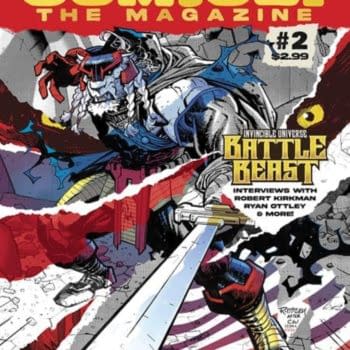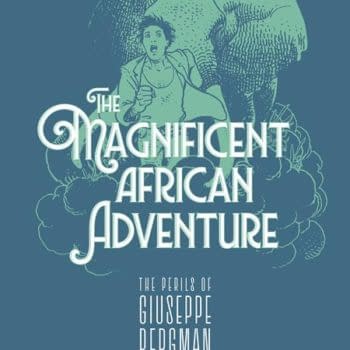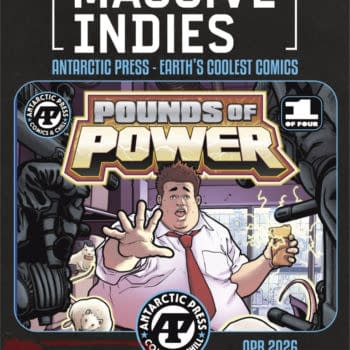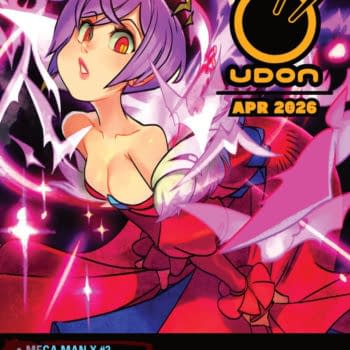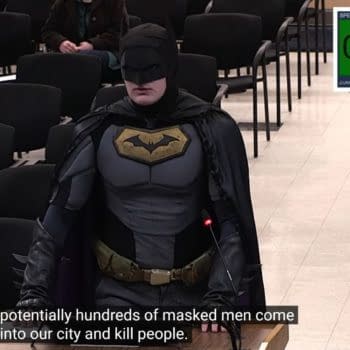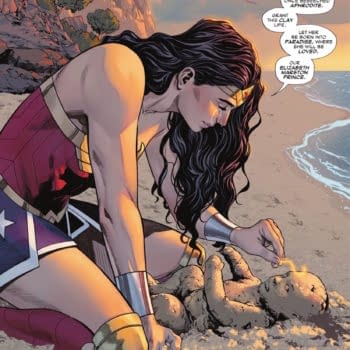Posted in: Comics, Recent Updates | Tagged: 2000ad, A Small Killing, Alan Moore, Another Suburban Romance, Aurum Press, big numbers, gary spencer millidge, Lance Parkin, Maggie Gray, Magic Words-The Extraordinary Life of Alan Moore, New York Comic Con 2013, The Killing Joke, v for vendetta, Watchmen
New Alan Moore Biography Magic Words Fills In Missing Years Of A Writer Ahead of His Time – The Bleeding Cool Interview With Lance Parkin at NYCC

When I spoke with Parkin at New York Comic Con, I was aware that it would be very hard for me to keep a professional distance as a reporter because I am also an Alan Moore scholar, currently writing about magic in Moore's works. But for that reason, I grasped the significance of what he had to say, and could glimpse the doorways that his book will open for fans and scholars hoping to fill in the gaps in their knowledge and find their own answers regarding this major literary figure and cultural phenomenon.
Hannah Means-Shannon: Can you tell me a little bit about the "authorized" versus "unauthorized" status of the book. Things changed for you over the course of working on the biography, didn't they?
Lance Parkin: I started writing this three years ago, and I sent a note via the convoluted route you have to send a note to Alan Moore saying, "I'm doing this book, if you don't mind", and all that kind of thing. And I got a very nice note back saying that he didn't want anything to do with it, didn't want to be involved at all. It wasn't negative, it wasn't positive. Very well, I thought, "You can write an unathorized biography that can be very interesting". I did that for three years. Wrote my book. We got it all edited and copyedited. We had a manuscript ready and my editor, Sam Harrison, said, "We should send it to Alan Moore out of courtesy". I kind of knew this was coming, so I said, "Ok". And we posted it to him on a Friday, and on Monday we got a phone call. Sam got a phone call saying that Alan loved the book and wanted to talk to me. That he had a couple of things he wanted to talk to me about, details. I'll give you an example: the name of the caravan site that he went to as a child. It wasn't like, "No, no, I didn't even write Watchmen", or whatever. He was very, very good about it. Straight away he just said, "It's your book. Don't feel that I'm imposing on you. You can do whatever you want". There are a couple of things. You can tell where they are in the book since it was done at such a late stage, where we just added a couple more quotes. Where he said, "Well, it didn't quite happen like that. I remember it happening like this".
[Parkin's bookshelf while working on this biography]
HMS: But he wasn't trying to be controlling, obviously.
LP: No. And he wrote a super-sweet endorsement for the book, which is on the cover now. Because it would be! And he's all in on it. He's very happy with it. I'm not speaking for Alan Moore when I say that, but I spoke to him for two two-hour interviews and the first one was him sorting out little details. The second one was just an interview. It was the most wonkish interview with Alan Moore ever because I was looking at these tiny gaps in this thing and asking, "There's this little thing you did in 1978. Can you tell me a little bit". So, it wasn't about the big stuff at all. It wasn't like, "What do you think of the V for Vendetta film?" It was about the tiny little details.
HMS: It sounds like he was happy with the bigger story that you had created so you didn't need to ask him about that stuff.
LP: I'm worried because I thought I was writing and unauthorized book. If subject of an unauthorized biography is happy with it, have I done my job wrong? But no, obviously I tried to be fair and I tried to be honest. And I think you can read this book and you will not see it as a universal praise of Alan Moore. There are times when Alan Moore does things that can be criticized, and where he does things that are difficult to explain. So, I wanted to be fair and honest. He told me not to bother his friends about the book, and not to bother his family. And obviously, I'm not going to rummage through his bins or anything like that. But the result of that is that I ended up talking to people who have had disputes with Alan over the years. So we have ended up seeing their point of view, and we've ended up with a list of people who have got criticisms. And it gives a nice, balanced picture to it. There's plenty of Alan Moore in there as well and I think you get both sides of a lot of arguments.
HMS: Well, it would be impossible to write a book about him without including those and still be a really good book.
LP: Or just go completely the other way and make it the Bumper Book of Alan Moore Feuds and gossip about that. This is a literary biography. I'm trying to write about Alan Moore's career and his work, and obviously his life's in that. And obviously it matters that it's Alan Moore. And it matters. His background and personality matter. And I'm interested in how his personality has affected his work. This is not the first book about Alan Moore and this is not the last book about Alan Moore. Other people can write that book, and it will be a very interesting book as well. And I talk about conflicts, it's all there, but it's not a list of feuds or arguments. I think people who see it will see that it covers a lot of ground and it tries to cover the ground as comprehensively as it can.
I would have not have spent three years writing a book about Alan Moore if I did not like the work of Alan Moore. I don't know the guy. It's not a book about "my friend Alan Moore", or wacky anecdotes about Alan Moore.
HMS: I imagine you must have read every single thing he's ever written by the end.
LP: Oh, and re-read them, and re-read them. I was lucky. I was reading Alan Moore before I knew it was Alan Moore stuff. He was writing in Doctor Who Weekly, and it wasn't credited. And I remember liking the early Time Lord stuff, and I think it's only the last one of those where he's finally credited. And then I'd started looking at 2000AD, and I found an issue of Warrior. I suddenly realized that the same guy was in all of these things doing different stuff. You recognize the name. Every comic fan does that–you recognize writers and you recognize artists. I'm lucky enough that I was reading it as it came out, on the whole. But I re-read it.
HMS: But you had the context of things that come out periodically over the long term rather than reading them as collections later.
LP: I think the other thing is the British context. That's the thing you realize when you do what I did. The first year of this book, I was making notes and making spread-sheets. You realize weird stuff, then. You realize that he's commissioned to do Halo Jones because of his success in America. It's not the other way around. But you realize that his work at DC is like this blip in his career. It's four or five years in his life. It's not his whole life. And when you look at his British work, it's more varied, it's funnier. There's a whole bunch of things going on. He's not just doing his dark superheroes. He's doing those really well, but he's also doing other things at the same time. And he's so versatile.
HMS: And the British work, you said, is more humorous?

HMS: I actually do find Rorschach very funny.
LP: You have to understand that these characters are taking themselves very seriously, but I don't think we're meant to. I think that comics fans, and I'm one of them, want comics to be serious, and we want them to be legitimate literature. So we take them very seriously and as worthy and of great political relevance. Watchmen has all that, but it's funny as well. So I just wrote a chapter saying, "Let's compare it with his funny stuff". So I've written a chapter where Watchmen's really funny. I'm very proud of that. All the way through the book, I had to take a different angle. I had to find new stuff. Gary Spencer Millidge wrote a fantastic book, Alan Moore: Storyteller. They literally announced it the day I signed my contract for this book. So I sat there for six months thinking, "Oh, God. Someone's just written my book". It's a fabulous book. There's so much text in there. I've used it for the book. I don't want to under-sell the book. It's a coffee table book with some fantastic images. The text in there is really good is well. What I would say about it, and this is a compliment, is that it's a standard account of Alan Moore's life. It's encyclopedic. It's really good on his music and has the CD. People who buy this book should buy that one as well.
HMS: It's a totally different creature, really.
LP: It is a totally different creature. I think the two work together really well. Just before Storyteller, I needed to come up with stronger materials and an approach on the material that wasn't just a recounting of the facts. They gave me three years to write it, which was a luxury for me. I'm used to writing things in weeks and months. So three years to have time to do it, to go back and throw away a draft of a chapter that isn't working, that kind of thing. I am really proud of the content of the book. The basics of Alan Moore's story are quite well known. I think most comics fans who know Alan Moore could probably do a pretty good stab at the Wikipedia entry for Alan Moore. So it's a question of what can I tell people that is true, and interesting, but also new to them. That they haven't seen before.
HMS: You had your work cut out for you.


HMS: Oh, yes, I know. I've been writing about that for a book I'm working on myself, about magic in Moore's works.
LP: We've got a plot summary. An original plot summary.
HMS: Wow! Is that in the book? Excellent.
LP: I saw, your eyes widened there!
HMS: I know. I know I didn't have that to work with. Now I can edit my work.
LP: Yes. That is one of those things. We've known the name and we've known a little about it. And we've guessed, but we've guessed wrong.
HMS: Yeah, people have argued about the lyrics and everything.

HMS: I've had a very hard time researching that. I often felt that there was nothing available. There was nothing talking about the little details. There was a standard story.
LP: Again, this is a transatlantic thing, I think. When you're talking about Alan Moore's politics, it's very easy to say, "Mrs. Thatcher was a political conservative", and do it with these very broad brushes. Alan Moore lives through it. There are these very specific government policies that directly affect him. And that's what he's reacting to. His day to day life is being impacted by these policies of Thatcherism. It's not a question of some broad philosophical position.
HMS: It's the texture of daily life.
LP: It's the texture and the little details. And it's that kind of thing that's really easy to gloss over or not deal with. When writing about comics, people tend to concentrate on comics and the comics industry and the known. I'm telling a biography that's trying to be a "proper biography", if you like. And not just be a list of quotes about his comics. So, that texture is the meat of the thing.
HMS: Well as you said earlier, this is a biography and also a literary biography.
LP: I've told this anecdote before, but I was at the University of York from the early '90's to the mid '90's. And Hermione Lee, a professor there, was writing what is now the definitive biography of Virginia Woolf. She was working on this, and we all saw bits of this incredible book. And I remember thinking, "Someone should write this book about Alan Moore". In 1993, that was a ridiculous thing to say. He'd written comics and they were great comics, but he was 40 years old. I'm older than that now myself. It was not quite there yet. But now I genuinely think that Alan Moore is one of the most important and interesting living British writers. And I think that because I read living British writers, not because I only read the New 52 or whatever. I think that if you look at the influence he's had. If you look at the cultural presence he's had, how he fits into the traditions of things. It's an absolutely mugs game to talk about where he's going to be in a hundred years in the canon, but if you look at him now, he's very clearly an important writer.
HMS: He's following the trajectory of these major figures in society.
LP: Yes, absolutely. And he's talking about things that people will still be talking about for decades to come. I'm not going to predict. I'm a Doctor Who fan. It's the 50th anniversary of Doctor Who. They are recovering episodes that they threw away because they didn't think anyone would be interested in them the next week. But it's an absolute mugs game to guess what people are going to be interested in in the future. But I think Alan Moore has the characteristics of someone who could well be important.
HMS: You can see a kind of configuration of traits in people, even when they are younger. Which is why you may have thought that in the '90's. But it often remains to be seen whether they will fulfill those elements.

So Jerusalem is a book that only he could write. It's an insane prose, personal cosmology novel-thing that only he could do. Another thing that's extraordinarily weird, sweet project, is about Steve Moore, Unearthing. I got the boxed set with a vinyl record and computer print-out. And it's this insane artifact. He has the license to do that. I think other people, not feeling the need to name names, but most writers, most freelancers, would go, "This sells. We should do more of this". Or the more generous version of that is, "Hey, if I do that, people will love it". He deliberately goes for these projects that are much more personal, more individual, much stranger. And that's got to be admirable in a writer.
HMS: He's not satisfied with himself unless it's contrary, it's against the grain.

Big Numbers is extraordinary. On a re-read, it is extraordinary. On a technical side, the characterization, the way he's unfurling it. The way it looks like something it isn't. I used to storyline Emmerdale, among other things. And it looks like a kind of soap opera. It looks like East Enders or Emmerdale. And you just read it and realize, no it is not. It's this extraordinary kind of slice of life thing but it is technically, incredibly complicated. And the techniques involved, it's mind boggling.
HMS: I can't yet even finish processing Big Numbers, though I've tried. I'm working on it.

HMS: Lance Parkin and I could have easily talked for hours about the intricacies of the new book and Moore's life, but thankfully, I was able to take home the book itself to answer some of my own questions. Thank you so much, Lance, on behalf of Bleeding Cool, for your time and insight. And I don't think it's a stretch to say thank you from we fans who will benefit so much from your hard work.
Hannah Means-Shannon is Senior New York Correspondent at Bleeding Cool, writes and blogs about comics for TRIP CITY and Sequart.org, and is currently working on books about Neil Gaiman and Alan Moore for Sequart. She is @hannahmenzies on Twitter and hannahmenziesblog on WordPress. Find her bio here.











